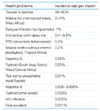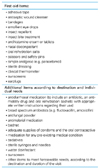Abstract
Travel medicine is an interdisciplinary specialty concerned not only with prevention of infectious diseases during travel but also with personal safety and prevention of environmental risk. Travel medicine focuses primarily on pre-travel preventive care of persons and less on the diagnosis and treatment of illness acquired in the tropics. To provide optimal pre-travel preventive service, it is needed for the travel health provider to be aware of the epidemiology of the many travel-related health risks. But still the knowledge of the precise risks for a specific disease in a specific location has proved elusive and the application of evidence-based standards to travel medicine is a challenge. The GeoSentinel, a worldwide communication and data collection network for the surveillance of travel related morbidity and mortality was initiated in 1995, and provides various epidemiologic features needed in pre-travel risk assessment. The three essential elements of pre-travel health service are risk assessment, risk management and risk communication. The risk assessment includes both assessing the health problem of the traveler and the risk of travel itself. Hence the health risks of a specific destination is changeable over time, they should be evaluated with last informations provided from World Health Organizations or other professional institutes for travel health. The essential services for risk management include vacccination, chemoprophylaxis (e.g.,malaria), and education the risk and prevention of insetborne, foodborne, animal-related diseases, behavioral safety, and any other known risks. The of travel-related diseases of Korean travelers are not quite clear yet. It is recommended that the travel-related disease surveillance system for Korean travelers should be improved so as to provide evidences needed to assess the risks and to prescribe preventive services.
Figures and Tables
Figure 1
Diagnosis according to syndrome group and travel region among ill travelers returning from the developing world.

Table 3
No. of notifiable infectious disease cases who infected in foreign countries from 2001 to 2008 (16)

References
1. World tourism statistics. Ministry of Culture, Sports and Tourism. [cited 2010. May 30]. Available from: URL:
http://stat.tour.go.kr/ptour1/index.do.
2. Hill DR, Ericsson CD, Pearson RD, Keystone JS, Freedman DO, Kozarsky PE, DuPont HL, Fischer PR, and Ryan ET. The practice of travel medicine: guidelines by the Infectious Diseases Society of America. CID. 2006. 43:1499–1539.

3. Traveler's health. CDC. [cited 2010. June 1]. Available from: URL:
http://wwwnc.cdc.gov/travel/default.aspx.
4. Steffen R, Amitrigala I, Mutsch Margot. Health risks among travelers-need for regular updates. J Travel Med. 2008. 15:145–146.

5. GeoSentinel-the global surveillance network of the ISTM and CDC. International Society of Travel Medicine. [cited 2010 June 1]. Available from: URL:
http://www.istm.org/geosentinel/main.html.
6. Freedman DO, Weld LH, Kozarsky PE, Fisk T, Robins R, von Sonnenburg F, Keystone JS, Pandey P, Cetron MS. for the GeoSentinel Surveillance Network. Spectrum of disease and relation to place of exposure among ill returned travelers. N Engl J Med. 2006. 354:119–130.

7. Gautret P, Schlagenhauf P, Gaudart J, Castelli F, Brouqui P, von Sonnenburg F, Loutan L, Parola P. for the GeoSentinel Surveillance Network. Multicenter EuroTravNet/GeoSentinel study of travel-related infectious diseases in Europe. Emerg Infect Dis. 2009. 15:1783–1790.

8. Schwartz E, Weld LH, Wilder-Smith A, von Sonnenburg F, Keystone JS, Kain KC, Torresi J, Freedman DO. for the GeoSentinel Surveillance Network. Seasonality, annual trends, and characteristics of dengue among ill returned travelers, 1997-2006. Emerg Infect Dis. 2008. 14:1081–1088.

9. Jensenius M, Davis X, von Sonnenberg F, Schwartz E, Keystone JS, Leder K, Lopéz-Véléz R, Caumes E, Cramer JP, Chen L, Parola P. for the GeoSentinel Surveillance Network. Multicenter GeoSentinel analysis of rickettsial diseases in international travelers, 1996-2008. Emerg Infect Dis. 2009. 15:1791–1798.

10. Swaminathan A, Torresi J, Schlagenhauf P, Thursky K, Wilder-Smith A, Connor BA, Schwartz E, Vonsonnenberg F, Keystone J, O'Brien DP. for the GeoSentinel Network. A global study of pathogens and host risk factors associated with infectious gastrointestinal disease in returned travellers. J Infect. 2009. 59:19–27.

11. Gautret P, Schwartz E, Shaw M, Soula G, Gazin P, Delmont J, Parola P, Soavi MJ, Matchett E, Brown G, Torresi J. for the GeoSentinel Surveillance Network. Animal-associated injuries and related diseases among returned travellers: A review of the GeoSentinel Surveillance Network. Vaccine. 2007. 25:2656–2663.

12. Lederman E, Weld LH, Elyazar IRF, von Sonnenburg F, Loutan L, Schwartz E, Keystone JS. for the GeoSentinel Surveillance Network. Dermatologic conditions of the ill returned traveler: an analysis from the GeoSentinel Surveillance Network. Int J Infect Dis. 2008. 12:593–602.

13. Wilson ME, Freedman Do. Etiology of travel-related fever. Curr Opin Infect Dis. 2007. 10. 20:449–453.

14. Hagmann S, Neugebauer R, Schwartz E, Perret C, Casteli F, Barnett ED, Stauffer WM. Illness in children after international travel: analysis from the GeoSentinel Surveillance Network. Pediatrics. 2010. 126:e1072–e1080. Published online April 5, 2010.

15. Schlagenhauf P, Chen LH, Wilson ME, Freedman DO, Tcheng D, Schwartz E, Pandey P, Weber R, Nadal D, Berger C, von Sonnenburg F, Keystone J, Leder K. Sex and gender differences in travel-associated disease. Clin Infect Dis. 2010. 50:826–832.

16. Korean Centers for Disease Control. 2008 White paper for disease control. 2009.
17. Korean Centers for Disease Control. 2007 White paper for disease control. 2008.
18. Van Herck K, Van Damme P, Castelli F, Zuckerman J, Nothdurft H, Dahlgren AL, Gisler S, Steffen R, Gargalianos P, Lopéz-Véléz R, Overbosch D, Caumes E, Walker E. Knowledge, attitudes and practices in travel-related infectious diseases: the European Airport Survey. J Travel Med. 2004. 1:3–8.

19. Ropers G, Krause G, Tiemann F, van Beest Holle Mdu R, Stark K. Nationwide survey of the role of travel medicine in primary care in Germany. J Travel Med. 2004. 11:287–294.

20. Centers for Disease Control & Prevention. Traveler's health-Yellow book. 2010.
21. Hill DR, Behrens RH. A survey of travel clinics throughout the world. J Travel Med. 1996. 3:46–51.

22. Keystone JS, Tessier D. A national survey of travel medicine clinics in Canada. J Travel Med. 2003. 10:247–249.

23. Kozarsky PE, Keystone JS. Body of knowledge for the practice of travel medicine. J Travel Med. 2002. 9:112–115.

24. WHO. International travel and health: situation on 1 January 2010. 2010.
25. Choi YH. Infectious diseases prevention for travelers. J Korean Med Assoc. 2005. 49:777–783.
26. Song JH. Travel Medicine: Recomendations for travellers to tropical area. J Korean Med Assoc. 1999. 42:704–709.
27. Steffen R, Heusser R, Maechler R, Bruppacher R, Naef U, Chen D, Hofmann AM, Somaini B. Malaria chemoprophylaxis among European tourists in tropical Africa: use, adverse reactions, and efficacy. Bull World Health Organ. 1990. 68:313–322.




 PDF
PDF ePub
ePub Citation
Citation Print
Print









 XML Download
XML Download